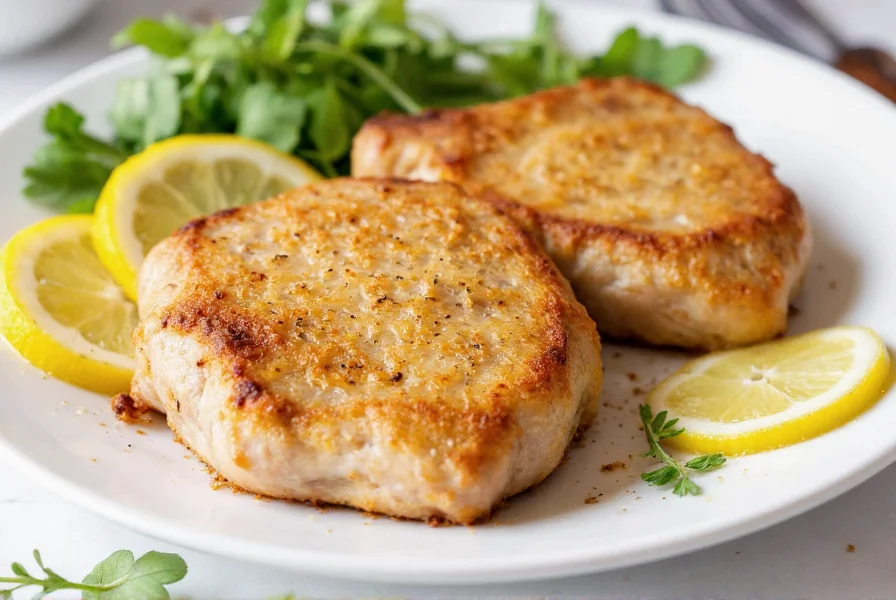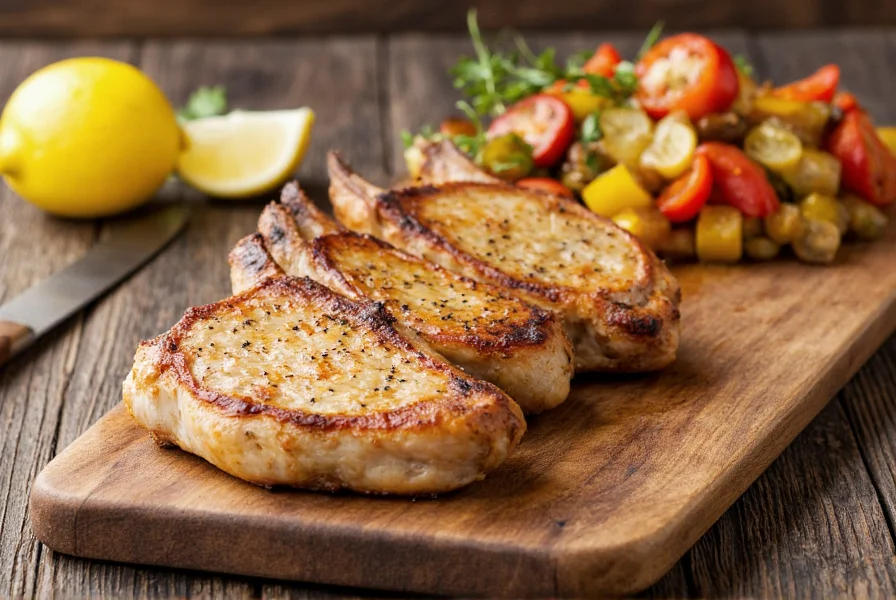Creating perfectly juicy lemon pepper pork chops requires understanding both the science of meat preparation and the flavor dynamics between citrus and pepper. This versatile dish combines the bright acidity of lemon with the bold warmth of cracked black pepper to create a restaurant-quality meal in under 30 minutes. The key to success lies in proper cut selection, seasoning technique, and precise cooking temperature control.
The Science Behind Perfect Lemon Pepper Pork Chops
Understanding meat composition transforms your cooking results. Pork chops contain muscle fibers that contract when heated, squeezing out moisture. The ideal internal temperature of 145°F (63°C) ensures safety while preserving juiciness, as recommended by the USDA. The lemon's acidity helps tenderize the meat's surface without making it mushy, while freshly cracked pepper creates a flavorful crust during the Maillard reaction.
Selecting the Right Ingredients
Not all pork chops and seasonings deliver equal results. Follow these selection guidelines for the best lemon pepper pork chops recipe:
| Ingredient | Quality Recommendation | Avoid |
|---|---|---|
| Pork Chops | 1-1.5 inch thick bone-in loin or rib chops with visible marbling | Thin-cut chops under ¾ inch thick |
| Lemon | Firm, heavy-for-size Meyer lemons for sweeter flavor | Dry or soft-skinned lemons |
| Pepper | Freshly cracked Tellicherry or Lampong black peppercorns | Pre-ground pepper or white pepper |
| Oil | Avocado oil or light olive oil (high smoke point) | Butter alone (burns at high temps) |
Homemade Lemon Pepper Seasoning Formula
Store-bought blends often contain excessive salt and fillers. Create your own balanced seasoning:
- 2 tablespoons freshly cracked black pepper
- 1 tablespoon lemon zest (finely grated)
- 1 teaspoon garlic powder
- 1 teaspoon onion powder
- ½ teaspoon sea salt (add more to taste)
- ¼ teaspoon red pepper flakes (optional)
Mix thoroughly and store in an airtight container for up to 2 weeks. The fresh zest provides brighter flavor than dried lemon peel, while freshly cracked pepper delivers complex aromatic compounds that pre-ground pepper lacks.

Step-by-Step Cooking Method
Follow this professional technique for restaurant-quality results every time:
- Prep the meat: Remove chops from refrigerator 30 minutes before cooking. Pat completely dry with paper towels - moisture is the enemy of proper searing.
- Season generously: Coat all sides with homemade lemon pepper seasoning, pressing gently to adhere. Let sit 10 minutes to allow flavors to penetrate.
- Preheat skillet: Heat 1 tablespoon oil in heavy cast-iron or stainless steel skillet over medium-high heat until shimmering (about 375°F).
- Sear first side: Place chops in skillet without crowding. Cook undisturbed for 4-5 minutes until deep golden crust forms.
- Flip and finish: Turn chops, add 1 tablespoon butter, smashed garlic cloves, and lemon slices to skillet. Tilt pan and spoon melted butter over chops for 1 minute.
- Check temperature: Remove when internal temperature reaches 140°F. Carryover cooking will bring to perfect 145°F.
- Rest: Transfer to cutting board, tent loosely with foil, and rest 5 minutes before serving.
Avoiding Common Mistakes
Even experienced home cooks make these errors when preparing easy lemon pepper pork chops skillet recipe:
- Overcrowding the pan: Causes steaming instead of searing. Cook in batches if necessary.
- Moving too soon: Wait until chops release naturally from the pan surface before flipping.
- Overcooking: Pork continues cooking after removal from heat. Remove at 140°F for perfect medium.
- Skipping the rest: Resting allows juices to redistribute. Cutting too soon releases precious moisture.
- Using low-quality pepper: Pre-ground pepper loses volatile oils. Always crack fresh for best lemon pepper seasoning for pork chops.
Serving Suggestions
Complement your lemon pepper pork chops with these ideal pairings:
- Vegetables: Roasted asparagus, garlic green beans, or lemon-dill roasted potatoes
- Starches: Creamy polenta, wild rice pilaf, or crusty bread for soaking up pan juices
- Sauces: Simple pan sauce made with deglazed skillet, chicken stock, and a splash of cream
- Wine: Crisp Sauvignon Blanc or unoaked Chardonnay balances the citrus notes

Storage and Reheating Tips
Proper handling maintains quality when enjoying leftovers of your perfect lemon pepper pork chops:
- Refrigeration: Store in airtight container for up to 3 days
- Freezing: Wrap individually in parchment paper, then place in freezer bag for up to 2 months
- Reheating: Best method is oven at 275°F until internal temperature reaches 130°F, then finish in hot skillet for 60 seconds per side to restore crust
- Microwave warning: Avoid unless absolutely necessary, as it makes chops rubbery and destroys texture
Frequently Asked Questions
How long should I cook 1-inch thick pork chops?
For 1-inch thick pork chops, sear for 4-5 minutes per side in a preheated skillet. The exact time depends on your stove's heat output, but the critical factor is internal temperature. Remove chops when they reach 140°F, as carryover cooking will bring them to the safe 145°F while resting. Thicker chops may require finishing in a 400°F oven for 3-5 minutes after searing.
Can I use bottled lemon juice instead of fresh?
While fresh lemon juice delivers superior flavor, you can substitute bottled juice in a pinch. Use 2 tablespoons bottled juice per lemon called for in the recipe. However, bottled juice lacks the bright, complex notes of fresh and contains preservatives that can create a slightly metallic aftertaste. For best results in your lemon pepper pork chops cooking time, always use fresh lemons when possible, especially for the zest which contains essential oils that bottled juice lacks.
Why are my pork chops always dry?
Dry pork chops typically result from overcooking or using the wrong cut. Pork chops reach optimal juiciness at 145°F internal temperature - higher temperatures cause excessive moisture loss. Bone-in chops retain more moisture than boneless. Additionally, skipping the resting period causes juices to escape when cut. For the juiciest results with your how to cook juicy pork chops with lemon pepper technique, use a meat thermometer, choose thicker cuts, and always rest for 5 minutes before serving.
What's the difference between lemon pepper seasoning and lemon pepper marinade?
Lemon pepper seasoning is a dry rub applied directly to the meat's surface before cooking, creating a flavorful crust. Lemon pepper marinade contains oil, acid (lemon juice), and seasonings, and requires 30 minutes to several hours of soaking time to tenderize and flavor the meat. For quick weeknight meals like your best lemon pepper pork chops recipe, the dry seasoning method works better as it doesn't require advance planning and produces superior searing. Marinades work better for tougher cuts that benefit from longer tenderizing.
Can I make this recipe in the oven instead of on the stove?
Yes, but you'll miss the crucial sear that develops complex flavors. For best results with what to serve with lemon pepper pork chops, sear first on the stove then finish in a 400°F oven. Preheat oven to 400°F, sear chops 3 minutes per side, then transfer skillet to oven for 6-8 minutes until reaching 140°F internal temperature. This hybrid method ensures proper browning while cooking through evenly, especially for thicker cuts over 1.5 inches.











 浙公网安备
33010002000092号
浙公网安备
33010002000092号 浙B2-20120091-4
浙B2-20120091-4